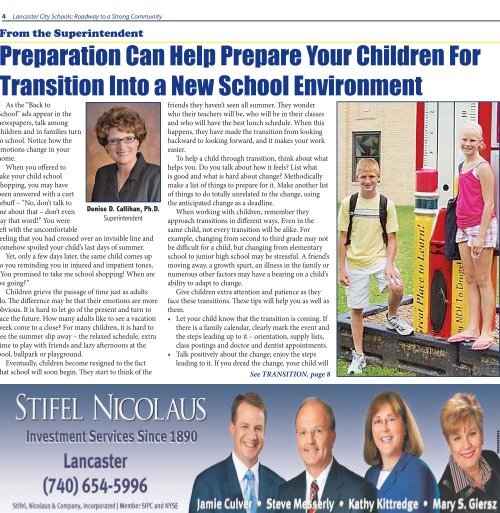FREE - centralohio.com
FREE - centralohio.com
FREE - centralohio.com
You also want an ePaper? Increase the reach of your titles
YUMPU automatically turns print PDFs into web optimized ePapers that Google loves.
4 Lancaster City Schools: Roadway to a Strong Community<br />
rom the Superintendent<br />
reparation Can Help Prepare Your Children For<br />
ransition Into a New School Environment<br />
As the “Back to<br />
chool”adsappearinthe<br />
ewspapers, talk among<br />
hildren and in families turn<br />
school. Notice how the<br />
motions change in your<br />
ome.<br />
Whenyouofferedto<br />
ke your child school<br />
hopping, you may have<br />
eenansweredwithacurt<br />
ebuff–“No,don’ttalkto<br />
eaboutthat–don’teven<br />
ay that word!” You were<br />
ft with the un<strong>com</strong>fortable<br />
Denise D. Callihan, Ph.D.<br />
Superintendent<br />
eling that you had crossed over an invisible line and<br />
omehow spoiled your child’s last days of summer.<br />
Yet, only a few days later, the same child <strong>com</strong>es up<br />
you reminding you in injured and impatient tones,<br />
Youpromisedtotakemeschoolshopping!Whenare<br />
egoing?”<br />
Children grieve the passage of time just as adults<br />
o. The difference may be that their emotions are more<br />
bvious.Itishardtoletgoofthepresentandturnto<br />
cethefuture.Howmanyadultsliketoseeavacation<br />
eek <strong>com</strong>e to a close? For many children, it is hard to<br />
ee the summer slip away – the relaxed schedule, extra<br />
me to play with friends and lazy afternoons at the<br />
ool, ballpark or playground.<br />
Eventually, children be<strong>com</strong>e resigned to the fact<br />
at school will soon begin. They start to think of the<br />
friends they haven’t seen all summer. They wonder<br />
who their teachers will be, who will be in their classes<br />
andwhowillhavethebestlunchschedule.Whenthis<br />
happens, they have made the transition from looking<br />
backward to looking forward, and it makes your work<br />
easier.<br />
To help a child through transition, think about what<br />
helps you. Do you talk about how it feels? List what<br />
isgoodandwhatishardaboutchange?Methodically<br />
makealistofthingstoprepareforit.Makeanotherlist<br />
of things to do totally unrelated to the change, using<br />
theanticipatedchangeasadeadline.<br />
When working with children, remember they<br />
approach transitions in different ways. Even in the<br />
same child, not every transition will be alike. For<br />
example, changing from second to third grade may not<br />
be difficult for a child, but changing from elementary<br />
school to junior high school may be stressful. A friend’s<br />
movingaway,agrowthspurt,anillnessinthefamilyor<br />
numerousotherfactorsmayhaveabearingonachild’s<br />
ability to adapt to change.<br />
Give children extra attention and patience as they<br />
face these transitions. These tips will help you as well as<br />
them.<br />
• Let your child know that the transition is <strong>com</strong>ing. If<br />
thereisafamilycalendar,clearlymarktheeventand<br />
the steps leading up to it – orientation, supply lists,<br />
class postings and doctor and dentist appointments.<br />
• Talk positively about the change; enjoy the steps<br />
leading to it. If you dread the change, your child will<br />
See TRANSITION, page 8<br />
0000459835
















